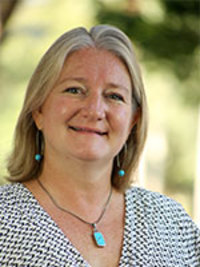Wendy Anderson
Professor and Chair of Environmental Science and Studies
Wendy Anderson, PhD, studies connect across ecosystem boundaries on Florida coastlines and the San Juan Islands of Washington state.
- PhD, biology, Vanderbilt University
- MS, biology, Baylor University
- BS, biology, Baylor University

Biography
Wendy Anderson studies various physical and biological movements of materials across ecosystem boundaries, particularly land-water interfaces. Since 1995, she has focused her research questions on marine impacts on terrestrial soils, plants and animals on islands in the Gulf of California, Mexico and the San Juan Islands of Washington state, always traveling with teams of student researchers. These studies have led to numerous publications and presentations, including a 2011 Oxford University Press book, Seabird Islands: Ecology, Invasion, and Restoration. In Florida, she plans to focus her research questions on marine inputs into coastal dune ecosystems and spoil islands in the Intracoastal waterway. Anderson joined the Stetson faculty as a professor and chair of environmental science and studies in 2014 after 16 years at another institution where she had served as a faculty member, department chair and campus sustainability director. In addition to her specific field research interests, her other scholarly interests include climate change, sustainable design, conservation biology and nature writing.
More About Wendy Anderson
Areas of Expertise
- Biology
- Plant Biology
- Ecology
- Community Sustainability
- Environmental Science
Course Sampling
- Introduction to Environmental Science
-
Sustainability Studies
- Fundamentals of Ecology
- Water and Society
- Ecosystem ecology
- Community ecology
- Plant physiological ecology
- Polis, G. A., W. B. Anderson, and R. D. Holt. 1997. "Toward an Integration of Landscape and Food Web Ecology: The Dynamics of Spatially Subsidized Food Webs." Annual Review of Ecology and Systematics 28: 289-316.
- Anderson, W. B. and G. A. Polis. 1999. "Nutrient Fluxes from Water to Land: Seabirds Affect Plant Quality on Gulf of California Islands." Oecologia 118: 324-332.
- Anderson, W. B. and W. G. Eickmeier. 2000. "Nutrient Resorption Efficiency and Proficiency Influence Forest Nutrient Cycling." Canadian Journal of Botany 78: 832-839.
- Anderson, W.B. and D.A. Wait. 2001. "Subsidized Island Bieogeography Hypothesis: A New Twist on an Old Theory." Ecology Letters, 4:289-291.
- Anderson, W. B. 2003 (2013, 2nd edition). "Biotic and Abiotic Influences on the Herbaceous Layer: Nutrients." In Gilliam, F.S. and M.R. Roberts, eds., Ecology of the Herbaceous Layer of Forests of Eastern North America, Oxford University Press.
- Anderson, W. B. and G.A. Polis. 2004. "Allochthonous Nutrient and Food Inputs: Consequences for Temporal Stability." Invited chapter for Food Webs at the Landscape Scale: The Ecology of Trophic Flow Across Habitats. Edited by Gary A. Polis, Mary E. Power, and Gary R. Huxel. University of Chicago Press.
- Heckman, K.A., W.B. Anderson, and D.A. Wait. 2006. "Distribution and Activity of Soil Crusts on Desert Islands in the Gulf of California." Biology and Fertility of Soils 43 (2): 263-266
- Anderson, W.B., D.A. Wait and P. Stapp. 2008. "Resources from Another Place and Time: Responses to Pulses in a Spatially Subsidized System." Ecology 89: 660-670.
- Mulder, C.P., W.B. Anderson, D. Towns, and P.J. Bellingham, Editors. 2011. Seabird Islands: Ecology, Invasions, and Restoration. Oxford University Press.
- Anderson, W.B. 2013. Drury University: "A Story of Personal and Institutional Transformation." Chapter 1 in P.F. Barlett and G.W. Chase, Editors, Sustainability in Higher Education: Stories and Strategies for Transformation. The MIT Press, Cambridge, MA.